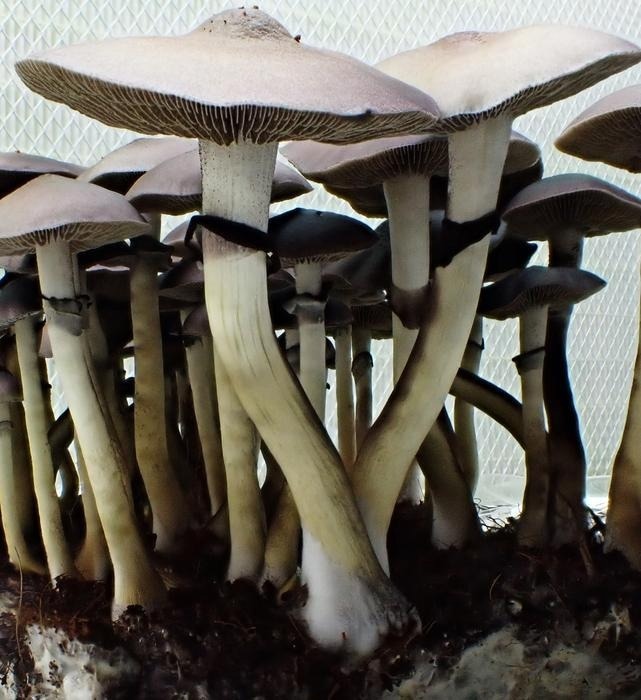Reviewed by Danielle Ellis, B.Sc.Dec 5 2023
Researchers have compiled genome data for numerous strains and varieties of “magic mushrooms,” aiming to understand the impact of domestication and cultivation on their genetic makeup.
 This photograph shows cultivated magic mushrooms grown at Funky Fungus (new cross of an Australian and cultivar). Image Credit: Alistair McTaggart.
This photograph shows cultivated magic mushrooms grown at Funky Fungus (new cross of an Australian and cultivar). Image Credit: Alistair McTaggart.
The study findings suggest the potential development of novel cultivars. The study reveals that Psilocybe cubensis commercial cultivars exhibit reduced genetic diversity due to human-directed domestication.
In contrast, a naturalized mushroom population in Australia retains higher diversity, showcasing unique gene variants responsible for regulating the production of psilocybin, the mushroom’s active ingredient.
The study was reported in the journal Current Biology on December 4th, 2023.
What was surprising was the extreme homozygosity of some cultivars of magic mushroom. Some of these cultivars have been nearly stripped of any diversity except at their genes controlling sexual reproduction.”
Alistair McTaggart, The University of Queensland
McTaggart added, “Whether this happened intentionally, by targeted inbreeding to fix traits over the last half century, or unintentionally through a lack of diversity to cross against is hard to know. The trailblazers who domesticated magic mushrooms have set the stage for how we can advance cultivation and innovate with shrooms as we improve our understanding of psilocybin and its benefits.”
According to McTaggart, the exploration of these mushrooms has been propelled by an underground community fascinated by magic mushrooms, many of whom collaborated on the recent study.
Without financial backing, enthusiasts interested in magic mushrooms from the broader community gathered the studied cultivars and isolates, sending samples at their own cost and risk. Ultimately, the researchers successfully sequenced and assembled DNA data for over 100 varieties of magic mushrooms.
As part of the study, the team sequenced genomes from 38 isolates in Australia and compared them to 86 commercially available cultivars.
Their goal was to determine whether the mushrooms were introduced to Australia and how domestication had altered commercially available ones. The analyses revealed that Australian mushrooms are naturalized, rebounding to a population size sufficient to maintain genetic diversity after their initial introduction to the country.
In contrast, commercial cultivars exhibit a significant lack of diversity across their genomes. The findings indicate that some unique gene variants in Australia may contribute to variations in the synthesis of psilocybin and related compounds.
The data generated on mating compatibility and genetic diversity controlling psilocybin production “will advance breeding for ‘designer shrooms,’ in which heterozygosity of psilocybin alleles may unlock variety in the production of psychedelic tryptamines,” stated McTaggart. In fact, he reports that their start-up company, Funky Fungus, has already begun applying the findings to develop designer cultivars.
McTaggart suggests that these developments could hold significance for the use of psilocybin as a natural compound, potentially offering benefits for treating mental health disorders.
Magic mushrooms are the cheapest source of psilocybin and may fill a niche in natural drug development. There is yet more to understand about how magic mushrooms produce other compounds that may impact a psilocybin experience, and this will be an exciting area of research to watch unfold.”
Alistair McTaggart, The University of Queensland
Source:
Journal reference:
McTaggart, A. R., et al. (2023) Domestication through clandestine cultivation constrained genetic diversity in magic mushrooms relative to naturalized populations. Current Biology. doi.org/10.1016/j.cub.2023.10.059.